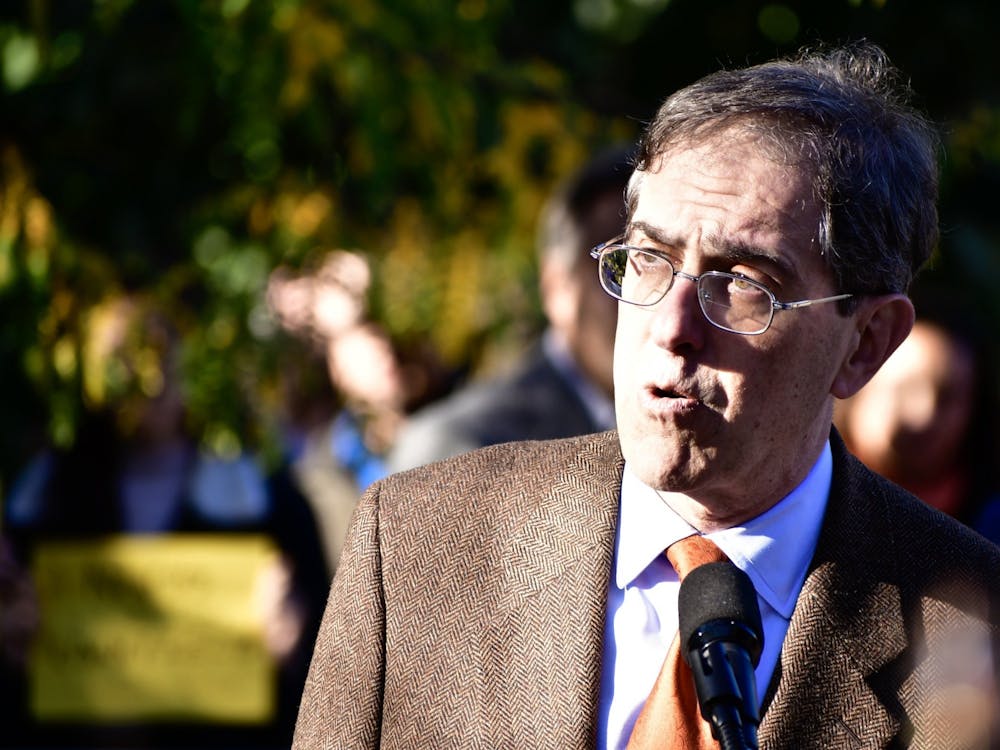In his State of the University letter published today, President Christopher Eisgruber ’83 weighed in on “heated debates” surrounding free speech, addressed calls for him to condemn community members, and looked ahead for the fall.
Eisgruber wrote in the letter that, while all undergraduates were invited back to campus, campus life has remained very different from years past. However, he expressed optimism about the fall semester.
“Much remains uncertain, but, as the vaccine rollout continues, we are planning for the fall with the expectation and intention of resuming fully in-person residential instruction,” he wrote.
“We will have to monitor and heed public health guidance as we decide when other campus activities — conferences, lectures, and the full panoply of intellectual colloquy — can resume,” he added.
While the annual State of the University letter typically discusses plans for the coming semester, Eisgruber instead chose to focus and reflect on Princeton’s institutional values in the wake of racial reckoning, political turmoil, and challenges wrought by the pandemic.
Free speech and condemnation
Describing himself as a “passionate defender of free speech,” Eisgruber advocated for meeting falsehoods and offensive arguments on college campuses “with better speech, not with censorship, suppression, or punishment.”
This comes after multiple free-speech-related campus controversies over the past year — including a student’s use of the n-word on social media, Classics professor Joshua Katz referring to Black Justice League, a former student group, as a “local terrorist organization,” and prominent conservative professor Robert P. George asserting that pronoun use could be a matter of ideology. These three instances each spurred backlash, with some students arguing the University’s stance in favor of free speech comes at the expense of inclusivity.

In his letter, however, Eisgruber emphasized his belief that free speech does not require treating all viewpoints as morally equivalent. Recklessly expressing offensive or false ideas, he wrote, is “utterly inconsistent with scholarly ideals.”
“Our University’s core value, however, is truth-seeking, not free speech per se. They are not the same thing,” Eisgruber wrote.
“To be sure, this University will fail in its scholarly and educational mission if we become an echo chamber in which viewpoints go unchallenged simply because they are popular amongst groups dominant on the campus,” he added. “We will also fail, however, if we treat all opinions as equally legitimate.”
Eisgruber also reiterated sentiments he had previously expressed about the role of the President not being one of denouncing or condemning the actions of individual alumni.

The Daily Princetonian Editorial Board recently called on Eisgruber to explicitly condemn Sen. Ted Cruz ’92 (R-Texas) for his role in amplifying false voter fraud claims leading up to the Jan. 6 attack on the Capitol. A student- and alumni-led petition went further, calling on Eisgruber to consider revoking Cruz’s degree and to preemptively bar his legacy from being honored on campus.
Eisgruber wrote that people ask him to denounce or condemn individuals and institutions “surprisingly often,” but he does not believe this to be the job of a university president.
“Earlier in my career, as a professor whose teaching and research focused on the Constitution, I published arguments about a wide variety of sensitive and controversial topics. I thought it my responsibility to do so, and I relished the opportunity,” he wrote. “My responsibilities as president are different.”
“My job is not to declare my own opinions but rather to protect the ability of others to do so as part of the vigorous, truth-seeking teaching and research that is the core of this University’s mission,” he concluded.
Department of Education investigation closed
Eisgruber responded to the Trump administration’s investigation of the University following his statements that systemic racism impacts the campus community.
“The Trump administration’s specious theory was that any institution that recognized the impact of systemic racism thereby confessed to having violated federal anti-discrimination laws,” Eisgruber wrote. “That was, as I expect even the Trump administration’s lawyers knew, pure baloney.”
He added that the University is in full compliance with all anti-discrimination laws and is committed to equality and inclusivity.
“Our initiatives to fight systemic racism are part and parcel of that commitment — an effort to go above and beyond what the law requires, as all of us must do if we are to realize our aspirations at this University and in this country,” he wrote.
“Doing so will require more discussions about challenging topics including race in America and at Princeton,” he continued. “I recognize that those conversations, while necessary and valuable, can also be painful and subject to misunderstandings.”
Eisgruber also added that “after its initial letter to us, the Department of Education took no substantial action on its bogus ‘investigation’ except to close it as the Trump administration left office.”
This comes one day after it was announced that the Department of Justice (DOJ) dropped a high-profile lawsuit against another Ivy League school, Yale, for alleged discrimination against white and Asian American applicants.
Welcoming future work and discussion
Eisgruber concluded the letter by reflecting on the past year and looking forward to the University’s future.
“I am grateful for what all of you have done to help Princeton persist in its mission over the past year,” he added. “I look forward to working with all of you as we ensure that Princeton emerges from this year stronger, more vibrant, and more fully inclusive than ever.”
According to the University website, Eisgruber will host two open meetings to discuss the letter and answer questions.
All members of the University community are invited to the annual Town Hall meeting of the Council of the Princeton University Community (CPUC) on Feb. 8, where student questions will be prioritized.
All University staff members are invited to a separate webinar on the morning of Feb. 24, during which employees will have paid release time.








